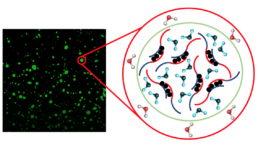Expertise
The Adams group has a strong background in physical chemistry and soft matter physics, utilizing spectroscopic methods. Key research topics include solvation dynamics, specific ion effects, and protein-water interactions1. In recent years, the group has developed spectroscopic methods for probing the solvent environment in biomolecular condensates, which revealed that release of hydration water is an entropic driving force for liquid-liquid phase separation1,2.
References:
- Adams et al. Local Mutations Can Serve as a Game Changer for Global Protein Solvent Interaction. JACS Au. 2021;1(7):1076-1085. https://doi.org/10.1021/jacsau.1c00155
- Ahlers, Adams et al. The key role of solvent in condensation: Mapping water in liquid-liquid phase-separated FUS. Biophys J. 2021;120(7):1266-1275. https://doi.org/10.1016/j.bpj.2021.01.019





